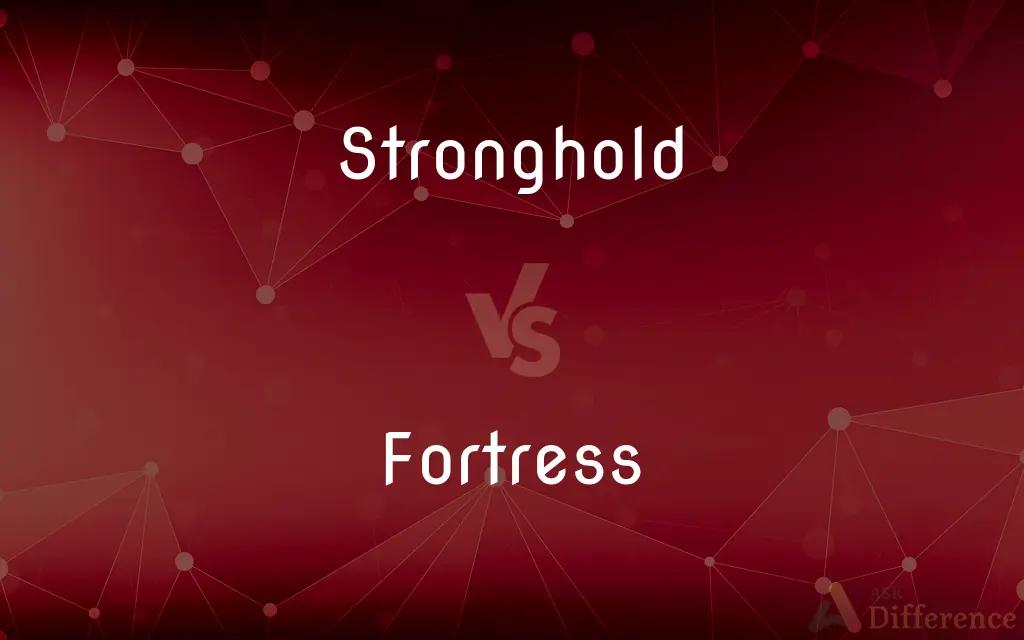Stronghold vs. Fortress — What's the Difference?
By Tayyaba Rehman & Maham Liaqat — Updated on March 19, 2024
Strongholds are secure places offering protection, typically smaller or symbolic, while fortresses are large, military strongpoints designed to resist attacks.

Difference Between Stronghold and Fortress
Table of Contents
ADVERTISEMENT
Key Differences
Strongholds often serve as symbols of safety or resistance, providing shelter and security on a smaller scale or in a metaphorical sense. They can be natural or man-made, offering a place of refuge or a bastion against challenges. Whereas fortresses are specifically designed for military defense, featuring extensive fortifications, walls, and armed forces, prepared to withstand prolonged sieges and enemy assaults.
In historical contexts, strongholds were pivotal in local defenses or as safe havens for smaller groups, often situated in strategic locations such as hilltops or within larger structures. On the other hand, fortresses were critical in national or regional defense strategies, built to protect cities, borders, or strategic points, and were equipped with heavy armaments and large garrisons.
Strongholds may also refer to places holding significant ideological or cultural importance, serving as centers for groups or movements. Meanwhile, fortresses are primarily concerned with physical defense and strategic military value, rarely holding symbolic significance beyond their martial role.
While both strongholds and fortresses are meant for protection, the scope of what they protect varies greatly. Strongholds can protect ideas, small groups, or specific points of interest, whereas fortresses safeguard larger areas, populations, or strategic locations from external threats.
Comparison Chart
Purpose
Offers protection, often symbolic or for smaller entities
Designed for military defense and to resist attacks
ADVERTISEMENT
Size
Generally smaller, can be natural or man-made
Large and heavily fortified
Usage
Can serve as safe havens, symbolic centers, or defense points
Primarily used for strategic military defense
Significance
Holds cultural, ideological, or local importance
Focused on physical and strategic military value
Scope of Protection
Protects ideas, small groups, or specific locations
Safeguards large areas, populations, or strategic points
Compare with Definitions
Stronghold
A place of security or survival.
The ancient tree was a stronghold for the endangered birds.
Fortress
A large fortified place, especially one that is capable of withstanding a prolonged siege.
The fortress stood unbreached after months of attack.
Stronghold
A place where a particular cause or belief is strongly defended.
The city was a stronghold for the revolutionary movement.
Fortress
A military stronghold, often including a town.
The ancient fortress protected the capital city.
Stronghold
A dominant position held in a particular field or area.
The company is a stronghold in the tech industry.
Fortress
A place equipped for defense against attacks.
The island was turned into a fortress against invaders.
Stronghold
A fortress or well-protected place.
The rebels retreated to their mountain stronghold.
Fortress
A person or thing not susceptible to outside influence or disturbance.
Her mind was a fortress, impervious to doubts.
Stronghold
A secure, fortified place offering protection.
The castle served as a royal stronghold during the war.
Fortress
A stronghold, especially one that is well-protected and impenetrable.
The fortress was built atop a hill for strategic advantage.
Stronghold
A fortified place or a fortress.
Fortress
A military stronghold, especially a strongly fortified town.
Stronghold
A place of survival or refuge
One of the last strongholds of an age-old tradition.
Fortress
A fortified place, especially a large, permanent military stronghold that often includes a town.
Stronghold
An area dominated or occupied by a special group or distinguished by a special quality
A feminist stronghold.
A stronghold of democracy.
Fortress
A fortified place; a large and permanent fortification, sometimes including a town; for example a fort, a castle; a stronghold; a place of defense or security.
Stronghold
A place built to withstand attack; a fortress.
Fortress
(chess) A position that, if obtained by the weaker side, will prevent penetration by the opposing side, generally achieving a draw.
Stronghold
(figuratively) A place of domination by, or refuge or survival of, a particular group or idea.
The last stronghold of the Cornish language.
Fortress
(transitive) To furnish with a fortress or with fortresses; to guard, to fortify.
Stronghold
A fastness; a fort or fortress; fortfield place; a place of security.
Fortress
A fortified place; a large and permanent fortification, sometimes including a town; a fort; a castle; a stronghold; a place of defense or security.
Stronghold
A strongly fortified defensive structure
Fortress
To furnish with a fortress or with fortresses; to guard; to fortify.
Fortress
A fortified defensive structure
Common Curiosities
What is a stronghold?
A stronghold is a place that offers security or protection, often smaller or symbolic, and can be natural or man-made.
What is a fortress?
A fortress is a large, fortified place designed for military defense, capable of withstanding prolonged sieges.
Can a stronghold serve a military purpose?
Yes, strongholds can serve military purposes, especially in local defenses or as strategic points, but they are generally smaller and less fortified than fortresses.
Are fortresses only used in wartime?
While fortresses are designed for wartime defense, they can also serve peacetime roles such as deterrence, training, and as historical sites.
Can a city be considered a fortress?
Some cities, especially historical ones with extensive fortifications and strategic importance, can be considered fortresses.
How has the concept of strongholds evolved in modern times?
In modern times, the concept of strongholds has expanded to include digital and ideological strongholds, reflecting the evolution of threats and protections.
Do fortresses still have a role in modern military strategy?
Modern military strategy has evolved, but fortresses still have roles in certain contexts, though they are often supplemented or replaced by advanced technology.
How do strongholds differ from fortresses?
Strongholds often have symbolic or local significance and can be smaller, while fortresses are large, heavily fortified, and focused on military defense.
Can a fortress contain a stronghold?
Yes, within a large fortress, there can be specific strongholds that serve as the last line of defense or as critical protected points.
Are there any famous examples of fortresses that have never been breached?
There are several fortresses renowned for their impregnability, such as Masada in Israel and the Fortress of Louisbourg in Canada, though many have eventually succumbed to new siege technologies or overwhelming forces.
Can a stronghold be a natural formation?
Yes, strongholds can be natural formations like caves or cliffs that provide protection or strategic advantage.
Were fortresses always built of stone?
Historically, many fortresses were built of stone for durability, but materials and designs have varied based on technology and geography.
What role do strongholds and fortresses play in cultural heritage?
They are key elements in cultural heritage, representing historical military architecture, strategies, and events.
What is the symbolic significance of strongholds?
Strongholds can symbolize resistance, safety, and the enduring strength of a community, idea, or movement.
How do strongholds and fortresses differ in their construction?
Strongholds may utilize natural features and require less extensive construction, whereas fortresses involve significant engineering, fortifications, and defenses.
Share Your Discovery

Previous Comparison
Rattlesnake vs. Copperhead
Next Comparison
Truth vs. DareAuthor Spotlight
Written by
Tayyaba RehmanTayyaba Rehman is a distinguished writer, currently serving as a primary contributor to askdifference.com. As a researcher in semantics and etymology, Tayyaba's passion for the complexity of languages and their distinctions has found a perfect home on the platform. Tayyaba delves into the intricacies of language, distinguishing between commonly confused words and phrases, thereby providing clarity for readers worldwide.
Co-written by
Maham Liaqat















































